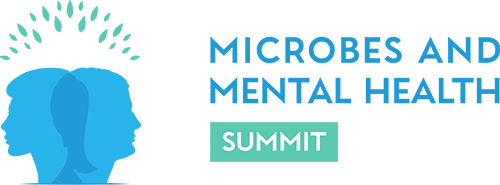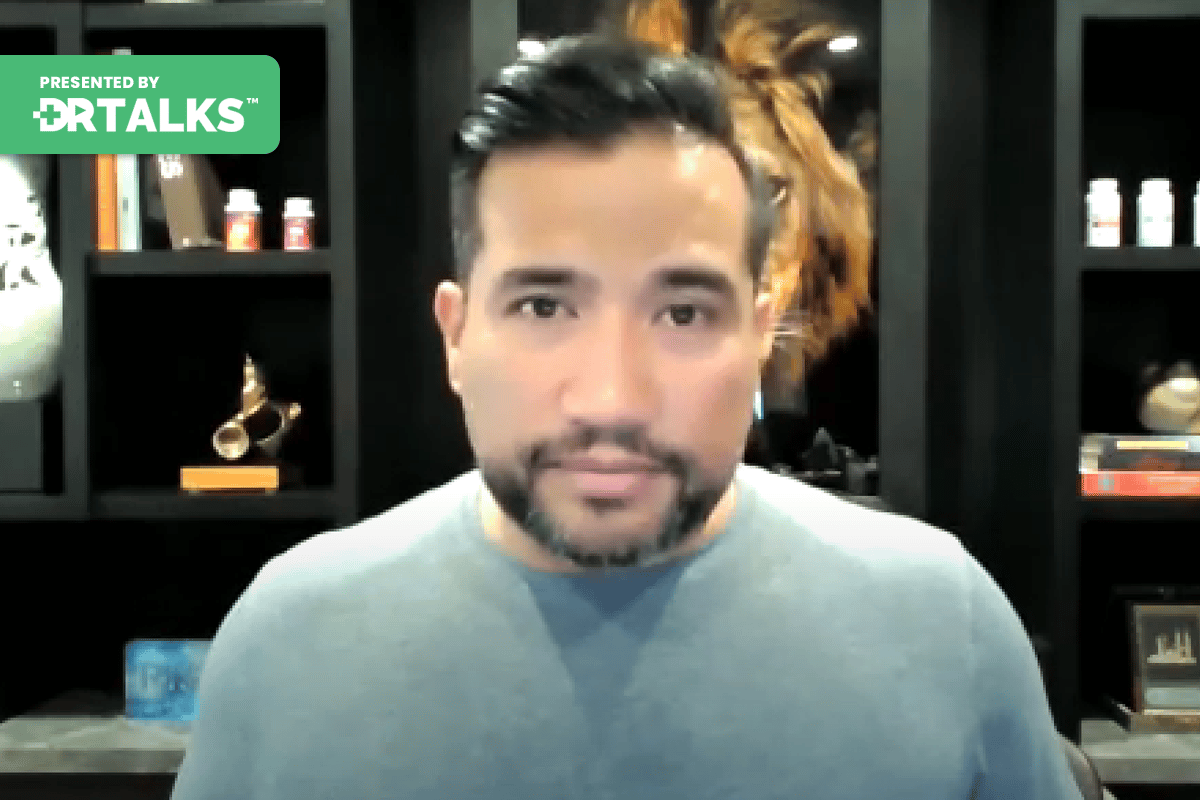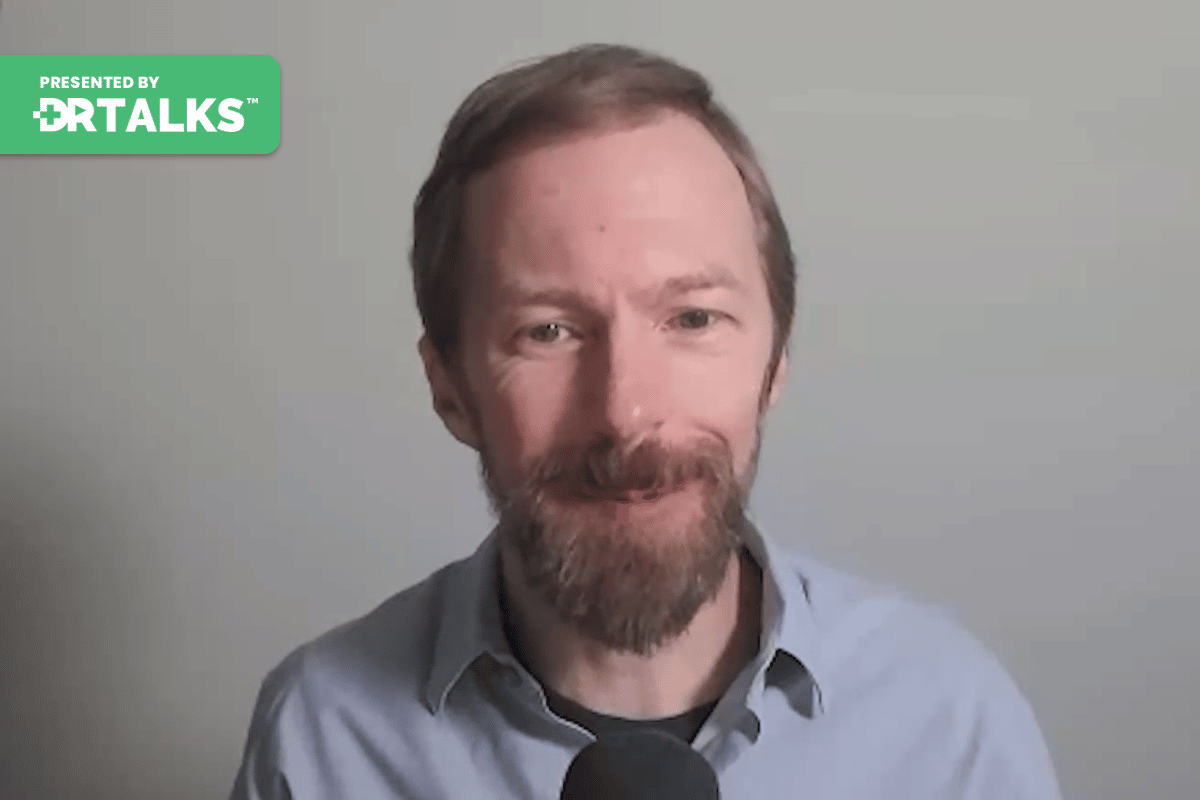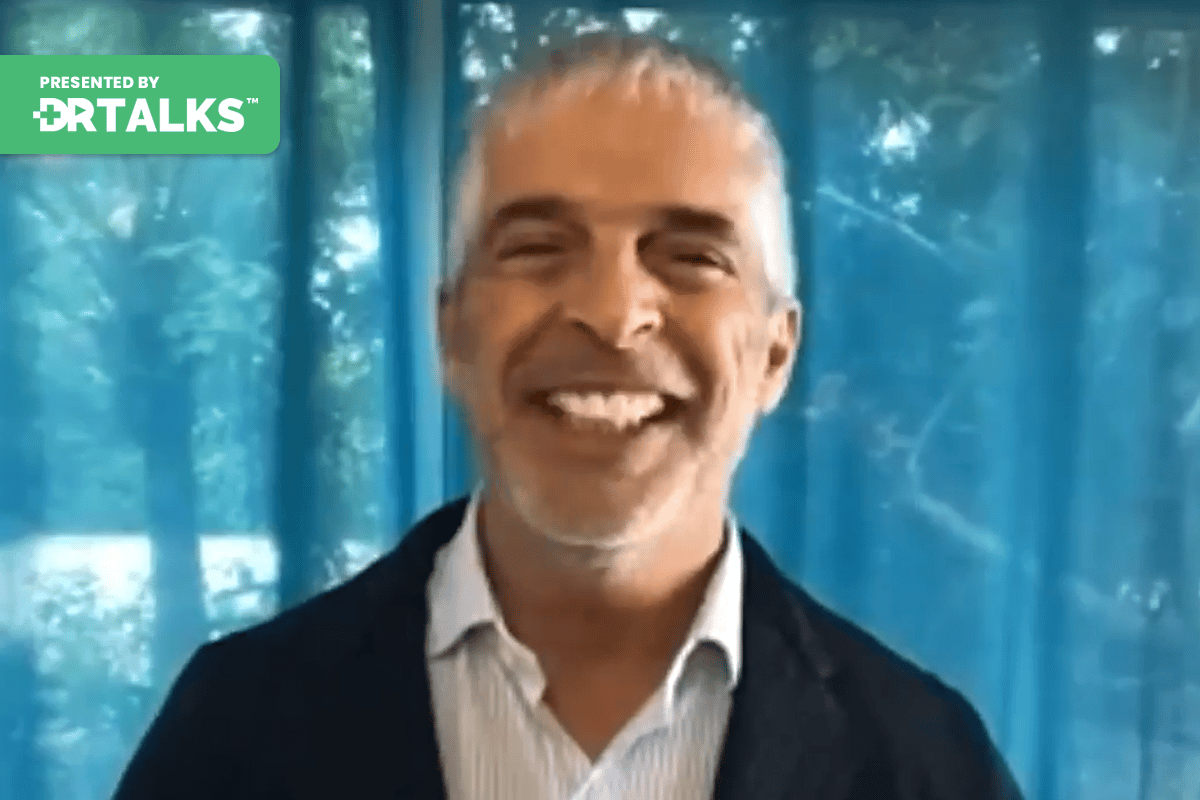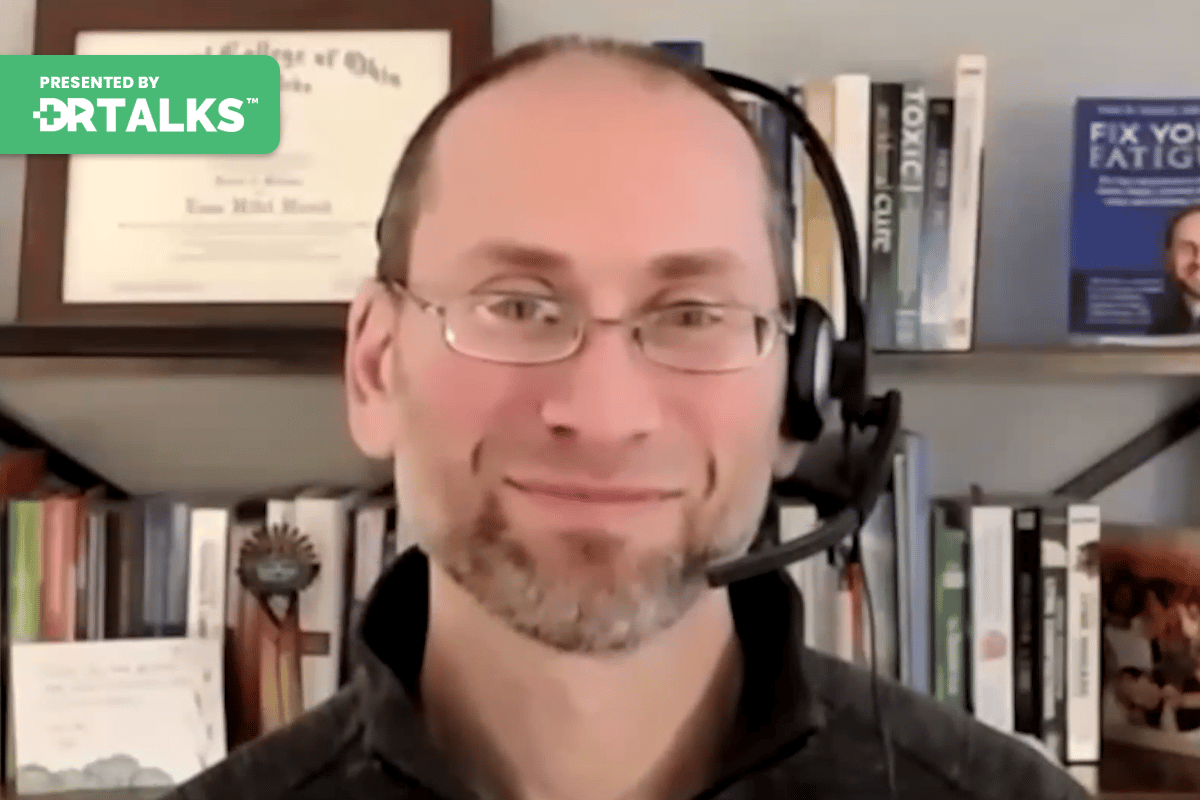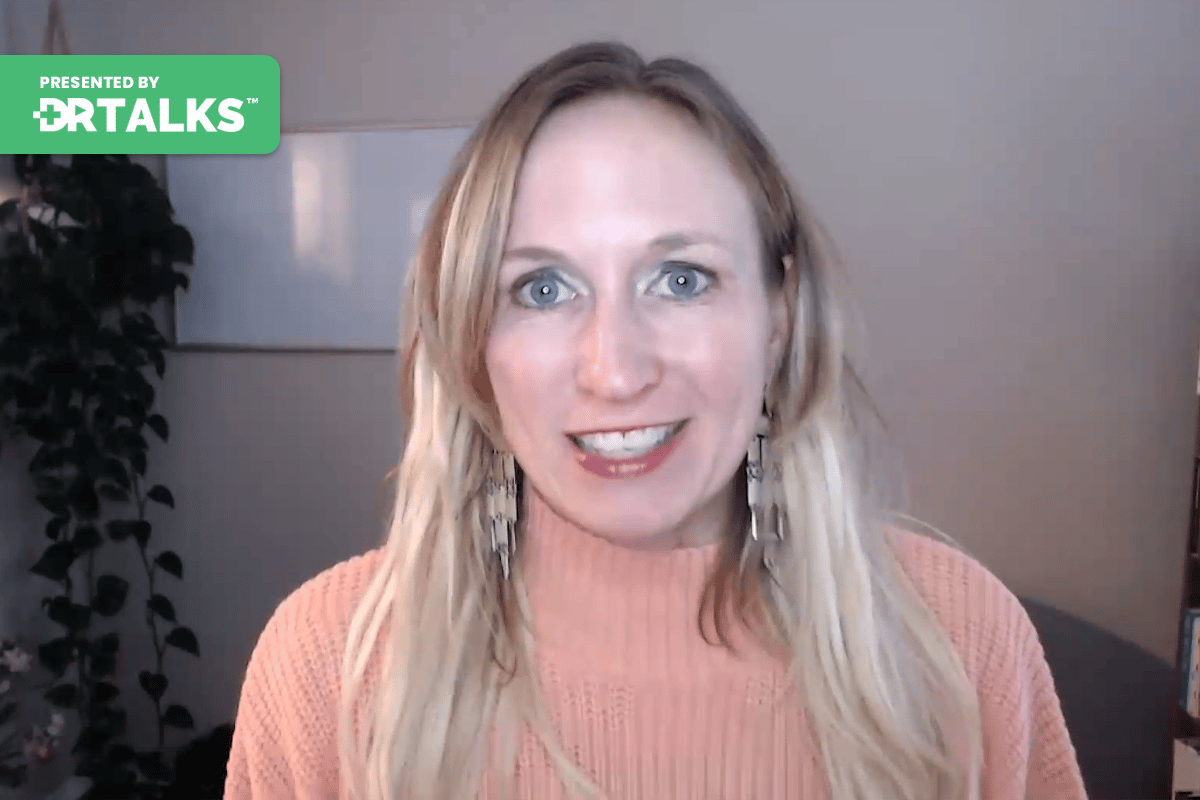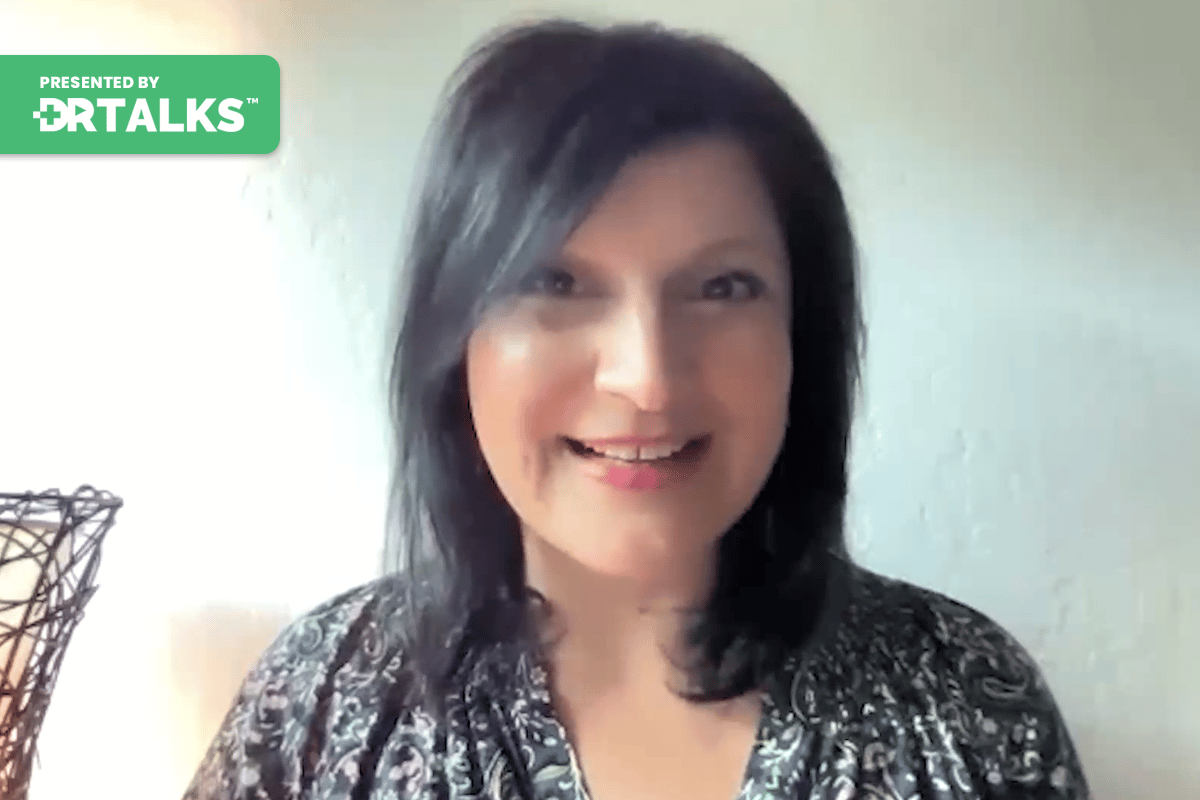Join the discussion below

Dr. Miles Nichols is a functional medicine doctor specializing in Lyme, mold illness, gut, thyroid, and autoimmunity. After Dr. Miles personally struggled with chronic fatigue in his early 20’s, Dr. Miles dedicated himself to figure out the root causes. He suffered with and recovered from thyroid dysfunction, autoimmunity, a gut... Read More

Kiran Krishnan is a Research Microbiologist and has been involved in the dietary supplement and nutrition market for the past 18 years. He comes from a University research background having spent several years with hands-on R&D in the fields of molecular medicine and microbiology at the University of Iowa. Kiran... Read More
- How endotoxins from leaky gut can cause changes in mood, serotonin, dopamine, and inflammation connected with depression
- Clinical trial on probiotics and reducing the endotoxin and inflammatory response to food
- Repairing the metabolic function for brain health, weight management, and chronic disease
- Nervous system dysregulation and the fight or flight response as induced by leaky gut and LPS
- Psychobiotics and peptidoglycan as important for brain development and function
- How psychobiotics can regulate the stress response, improve neurotransmitter balance in the brain, and attenuate the stress response
- Where to start for addressing LPS and peptidoglycans together with diet, lifestyle, and mind-body practices
Related Topics
Anxiety, Biotechnology, Brain Disorders, Chemical Imbalance, Clinical Trial, Combination Product, Complexity, Cytokine Theory, Depression, Diversity, Endotoxin, Gut Microbiome, Gutbrain Connection, Health, Industry, Inflammation, Mechanisms, Mega Spore, Mental Health, Microbial Environment, Microbiology, Microbiome, Organisms, Pizza, Probiotics, Psychobiotics, Root Causes, Science, Stress, Translational Gap, WellnessDr. Miles Nichols
Hello everyone and welcome to the microbes and Mental health summit. I’m your host Dr. Miles Nichols and I’m here today with Kiran Krishnan who has been a pioneer in the field of researching aspects of the microbiome and gut microbiota impacts on systemic health, including mental health. And so as a research microbiologist, he left his academic career to really work on health and wellness and the research that has come out of Kiran’s work is fantastic and we’ll be exploring some of that research as well as some of the mechanisms of action behind how gut microbes can impact the psycho by OEM and the psycho biotics are in the gut brain connection. So welcome, Kiran, thanks for being here.
Kiran Krishnan
Miles, thank you so much for having me. It’s a pleasure to be here.
Dr. Miles Nichols
So give a little back story on how you got into switching gears in your career to becoming interested in looking at health and wellness and the gut microbiome.
Kiran Krishnan
Yeah, absolutely. You know I’ve always been a big fanatic of science and I’ve been a nerd all my life, my parents about scientists in one regard of the other. My mom’s a medical doctor and as a great clinician and my dad was a microelectronics engineer. So he invented a lot of things. He’s got over 200 US patents in his name for things that are in all of our electronic devices. So you know I had I think I got a little bit of both of those components of the brain, that the systems engineering component as well as the biological clinical science component of it. So I got a little bit of each of them and so that made up my mind set and I knew I was going to go into something related to the sciences. I got into microbiology really from a movie from the movie outbreak a long time ago that was playing in my dorm in my freshman year. I think in the second day of school actually as I was trying to figure out what I wanted to study and what excited about what excited me about that movie was, you know, this was a viral outbreak and these virologists and microbiologists chasing this virus to try to figure out the source and the cure and so on. And that just seemed like really exciting science for me, right? So that’s what got me into microbiology and kind of down the academic track. But you know, once, once I’m in there and I’m starting to do research work and all that in at the university level, you start to see a problem with something we call the translational gap, right? So that’s the translating all of the work, all of the research that goes on and all the universities in the world, there’s just so much research happening and every one of these institutes. But so little of it ever gets translated to impacting people, right?
And a lot of that is because of just the models of how these things work. You know, research at university levels are being done for the sake of research, you know, that they’re the careers of the professors and postdocs and all that are dependent on just doing more and more and more studies. And with every study they want to go a little bit deeper into the mechanism and a little bit deeper into the molecule, a little bit deeper. And so it’s an endless rabbit hole if you will of studying a single process, a single molecule, a single enzyme for your entire career. And that’s great. A lot of information comes out of that. But then at some point, somebody needs to translate that into something that actually impacts people. That’s a gap in the chasm that I saw when, you know, looking at university research and that’s where I wanted to bridge that gap, right? So, I wanted to get myself into industry, into a place into biotechnology, where I can then take university level research and all the stuff that comes out of these institutes and then actually translated to something that impacts people on a day to day basis. So that was my leak then from that whole academic sign into the commercial side of science.
Dr. Miles Nichols
And that’s so important because it’s so easy to cherry pick looking at different studies that can say, oh, this organism does this and this organism does that. So let’s try putting them both in a product and just see how people respond that’s very different than doing a clinical trial on a combination product with actual people. And we met about six or seven years ago was at a conference. And at that time there had been a clinical trial that had been recently published around intestinal permeability and leaky gut. And what I really appreciated about it is that it took college students and gave them an unhealthy meal and induced a leaky gut and then gave a product that was a combination of these four forming probiotics and then Saw if giving that same meal to the ones who had taken that for 30 days. Was there a change? And this kind of clinical trial which showed dramatic and positive about comes is taking that data that we think, Oh, it could do this and saying, Oh, it did do this in a clinical trial.
Kiran Krishnan
That’s exactly right. And and and it becomes very relevant to day to day living, right? Because, that was one of the big problems we saw in the industry. So then everywhere I go, I’m like seeing these problems and I’m like, how do I resolve this at the academic level? It’s like very little of this. If any gets translated to something that impacts humans, then you come to industry and you go, wow a lot these companies just making assumptions, making scientific leaps, connecting dots that maybe don’t necessarily connect without evidence. And then, and then slapping products together and marketing it out there. Right. And the assumption across the board, especially with microbes is that, you know, one plus one plus one is going to equal four. And so they’re gonna, you know, add all these things up together Somehow. It’s going to be magically an amazing combination. But these are biological entities, right? They’re highly complex. There are millions of genes. They perform all of these metabolic functions. So you cannot assume that you add these 234, 1520 strains together that they’re somehow going to necessarily play in a friendly manner or not be antagonist. Stick to one another or not counteract one another’s functionality.
And so that was the other kind of bar we were trying to set is that, hey, listen, probiotics can be extremely powerful if you have the right strains at the right dose and for the right indication. But you cannot assume they’re gonna work because the not only are they complex, they’re going into a system that’s, you know, a billion times more complex than the probiotic is. Right? Because we’re talking about sending these microbes into a sea of 40 trillion plus organisms and millions of genes and just a level of complexity. We can’t even wrap our head around. So all those assumptions that are being made shouldn’t be made at all. So we want to do the first trial on the combination product called mega spore. We had a good hypothesis that these work well together. But again, we don’t know that until we did the trial. And what was great about this trial is that it basically mimics just regular behavior of people. You know, we didn’t control their diet, we didn’t control their lifestyle, we didn’t control their behaviors. We just we challenge their system under actually in the case of college students something they do on a regular basis anyway. You know, the challenge meal we gave them was actually a pizza. You know, and they’re like okay yeah, I’ll come in and eat pizza. And just yesterday, you know, and so our premise was that if it protects their system from this and given 30 days of taking the product, 30 days of all of this challenge that they’re giving themselves, then we have some real world evidence that this is doing something that the microbiome. And then it gives us the opportunity to dig a little bit deeper to understand the mechanisms and so on.
Dr. Miles Nichols
And that the outcome was so positive on that trial that it really spurred a lot of popularity because it wasn’t. There is and has been for so long this sense of well yes, we know that we take a germ free mouse and then we injected with the microbiome of no obese mouse and it becomes obese but which bacterias and there’s this search for the magic one and the keystone and the the one that’s going to make it all and then it’s just failed over and over again. And the recognition has become it’s this ecology. It’s there’s diversity that’s important. And there are these inter plays that are very difficult and complex to understand how they’re talking to each other’s quorum sensing. There’s a lot happening within the context of the microbial environment that is not so cut and dry as people thought initially when diving into the research and looking at the germ free mouse model. So this clinical trial is so important to have awakened, awoken, a sense of an ability to start to see very practical pragmatic application of probiotics in a population that lead to a result that did significantly reduce the endo toxin. I’d like to talk about endo toxin a little because that endo toxin we know can create inflammation. And that inflammation has been connected with depression. There’s a whole body of research on a cytokine theory of depression that talks about inflammation, triggering being potentially a trigger for cause for indoor perpetuators of depression and depression symptoms. So, can we talk a little bit more about endotoxin And you can go on that study or wherever you’d like to with endo toxin and how that relates to the gut microbiome.
Kiran Krishnan
Yeah. You know, and this can be somewhat counterintuitive to people, right? Because what most people understand and remember is that depression or anxiety and even sleep disorders are disorders of the brain and because we are in many ways programmed to think of the body and silos that they think of this as a brain issue. So there’s something off in your brain. There’s a chemical imbalance. I used to hear that all the time, and people still say that chemical imbalance in the brain, not necessarily connecting other potential root causes that may drive this outcome of the brain itself, right? And then when you start to think about the connections of the brain has all the different parts of the body, of course, the brain controls virtually everything that happens in the body. But there’s one part of the body where the brain actually has almost in one perspective, less control over this part of the body than this part of the body has on the brain. And that is the gut, right? So, if you look at the communication pathways, there’s almost two times more communication pathways going from the gut to the brain than brain to the gut. Right? And so they are connected. It is bidirectional, but there seems to be twice as much a flow of information control neurotransmitters, peptides, Everything you can think of from the gut into the brain rather from the brain into the gut, right? There’s almost no other area in the body where this exists. Because everything else that your brain controls your muscles or your, you know, your heart, your soft tissue, all these areas they send neurological feedback to the brain. But it just you know single modes of communication. So the gut and the brain are this very dynamic relationship between the two of them.
And in fact you know most people call the gut like the second brain. I actually prefer to refer to the two of them as this. The two parts of the same exact system, right? They are connected system. There are two polar ends of the same system with lots and lots of similarities on both ends. And when you think about the brain and what it requires on a day to day basis to function, it has some of the highest nutrient demands in the body. Right? Highest caloric demands. It is you know pound for pound, the hardest working part of your body. And so it’s micronutrient, its mineral, its enzymatic, its peptide, its fatty acid demands all through the roof compared to the rest of the body. And it gets all of that from the gut, right? And the gut has to not only at the most basic level process the food that’s coming in be able to to break down and assimilate the nutrients that are coming in from food and put them in a usable way that the brain can use them. And then the gut with the microbiota also produce lots and lots of compounds that are required for proper brain function that we cannot get from food, that we cannot extract from things that we can’t make ourselves. And so there’s just so much dependency on basic functionality of the brain that comes from the gut. Now that is the typical extent to which we talk about the gut and the brain, right?
We talk about the relationship how the gut supports the brain, there’s some support from the brain to the gut and so on, where we stop the conversation often. And I think to me this is probably one of the most important parts of the conversation is how a dysfunctional gut actually becomes the most toxic thing to your brain, right? So your gut is somewhere on the spectrum where on one end it is the best friend to your brain, It is preserving your brain repairing your brain, reducing toxic damage, your brain, feeding your brain with everything it needs, maintaining all of that neurological integrity and functionality to the other end of the spec Where it’s absolutely destroying your brain every single minute of every single day. Right now people’s brains, guts are somewhere on that spectrum, very few people on this very end where the gut is 100% a friend of the brain and or very few people on this end where the gut is 100% an enemy to the brain. Many people kind of lean towards the enemy side and so that’s the part that is so important to tackle because once you start to realize that you start to think that and you start to understand that in order to support the brain and all its functions, you absolutely have to pay attention to the gut, right? And if you don’t pay attention to the gut, you’re actually missing the largest component in your body that controls and affects the brain. Not only how it functions, but whether or not that component is absolutely toxic to the brain. So that’s a long story around coming back to LPS right? Which you asked for a light LPS is that quintessential example of a dysfunctional gut that is toxic to the brain, right? And LPS is this endo toxin endo meaning that it’s made within the body compared that to an X. A. Toxin that comes in from the outside world. So the difficulty of an endo toxin is you can’t get away from it, It’s constantly being made inside the system.
So it’s a toxin. The way the way it looks from a molecular structure standpoint is it’s got this like little carbohydrate head and it’s got these little lipid tails and the lipid tails which are made of fatty acids look like the fossil the lipid bi layers of your of your cells right? The problem with it looking like that is that it’s incredibly pervasive, it can get into almost any part of your body, it can enter every kind of cell in your body without any sort of disruption to it. And anywhere it ends up it creates massive amounts of inflammatory responses. The reason for that is LPS. This lipo policy back ride is a feature of gram negative bacteria. Now every bacteria in your in the world in your system can be categorized as gram negative, gram positive. That just means whether or not they have an outer cell wall structure, they don’t. A lot of pathogenic bacteria, severe pathogenic bacteria are gram negative and they have this LPS in them and the immune system and your body has come to recognize over the ages that when you see this LPS, it’s probably associated with the bad bacteria.
Right? And so your immune system takes it very seriously when it runs into LPS inside the body in circulation. Now most of this lPS is sitting in the lining of your intestines. It’s sitting in that mucosa layer, trapped in that mucosa where most of the gram negative bacteria are. So these bacteria in their metabolizing, they’re doing whatever they do and from time to time they die and when they die the cells open up and they release their lPS into the mucosa in a healthy gut, it would just stay in the mucosa. Right? And then eventually as mucosal layer grows and it slips off the top, you’ll lose that LPS, you’ll poop it out essentially and it’s gone from your body. Now if your gut is leaky and dysfunctional and your mucosa layer is eaten away, you lose that barrier and that LPS is not stuck in the mucosa anymore. It’s allowed to leak through past your intestinal lining and enter into circulation. So now you’ve got a car constant flow of this very potent endo toxin from the lining of your gut, past that lining into circulation every single minute of every single day. And it becomes a big problem because one of the areas that ends up in is in your brain. Now when it ends up in your brain, it can induce a few different things. Number one, there’s evidence that shows that LPS can bind to serotonin receptors and inhibit the function of serotonin.
They can also bind to dopamine receptors and inhibit the function of dopamine. For people who aren’t aware, serotonin is you’re happy right? When you have dysfunction in serotonin, when you have low levels of serotonin, you feel depressed very hard to feel happy. Very hard to elevate your mood. Same thing with dopamine when you have low levels of dopamine, you don’t get satisfaction from anything. You don’t, the reward centers of your brain aren’t kicked on, it’s very hard to gain pleasure from things. And so people start getting addictive like behaviors because you’re constantly trying to stoke dopamine to feel that reward right to feel good about something. So just from that alone, it creates a significant amount of dysfunction of the brain Because you may be making enough serotonin you may be making enough dopamine but your brain can’t bind it to use it. The other part of it is the inflammation that it causes in your brain and other parts of the tissue. LPS being an endo toxin when it makes its way into a tissue, your immune system ends up detecting it eventually and it causes an inflammatory response. Because your immune system thinks oh my God LPS is there. That must mean there’s bad bacteria in the area potentially infecting the whole.
So let’s go crazy let’s recruit all of the immune cells that they can to come to this area to try to protect the host. Your immune system thinks your brain is under attack by dysfunctional bacteria. So it starts inducing all of this inflammatory response. The crazy thing about inflammation in the brain is that that is actually a way your sympathetic nervous system triggers the flight or fight response. Right? It uses inflammation as a way to trigger fly to fight when you need to have flight or fight response. Right? So if you’re walking around your sense of a danger, your hypothalamus gets kicked up your pituitary then your adrenals kick up cortisol. Your sympathetic nervous system turns on and releases cata cola means which increase inflammation in your brain in your heart and your muscles. That’s the process of turning on the flight or fight response. Now if LPS is in your brain creating inflammation, your brain’s gonna think you’re in flight or fight all the time and it’s gonna keep activating that HP. A. Access. Right? So now, not only can you not bind the happy hormone not buying the dopamine, which gives you the reward centers, it makes you feel good about the things you do, you’re also triggering flight or fight response at the same time. Right? So just from those three alone and there’s more mechanisms at play that make it even worse. But just those three components alone, you can start to see how your gut is allowing this endo toxin to leak through and accumulating in the brain. How that can take somebody who has perfectly normal brain chemistry right? Doesn’t have a congenital issue with severe depression and all that, it can create an environment in which the brain is getting kicked on and the brain thinks you’re under attack all the time and you’re in danger. Right? So that’s the foundation of this LPS and its ability to create anxiety and depression.
Dr. Miles Nichols
It’s such a beautiful way to describe from all the way back to the way that the gut and the brain are interacting is significant in those signals from the gut to the brain are more than from the brain to the gut. My favorite study that illustrates this looked at two groups of mice gave one a probiotic, the other a sterile feed, subjected them both to a stress test, had them swim in water. The one with the sterile four minutes gave up the one with the probiotic five minutes, six minutes still going not giving up. And so they wanted to see why and they suspected that maybe it was this probiotic sending signals from the gut via the vagal nerve to the brain. And they measured some neurotransmitter Gaba, which is a relaxing neurotransmitter. And they found that the ones with the probiotic feed we’re producing a lot of Gaba and relaxing themselves as they were stressed.
They had stress hormone and Gaba. They were balancing out their stress response on the fly. Whereas the ones that had the sterile broth didn’t have Gaba were burning themselves out with the stress response and giving up and resigning. And when they decide to take the group that had the probiotic feed and cut their vagal nerve to see if it was indeed signals from the gut view of the vagal nerve, they reverted back immediately to the old stress response weren’t producing the gap anymore. So that was definitively showing that it was a signal from the gut to the brain because of a gut microbiota. Little impact to the ecology and the gut that was telling the brain to produce Gaba which is a neurotransmitter. So we absolutely see multiple mechanisms. Even another one there of signaling from the gut to the brain in order to regulate neurotransmitter function and then you mentioned so beautifully about the palace aka ride and how that permeable membrane in the gut and how these infections these gut dust bios issue that can over grow when the gut is healthy is no problem.
From the perspective of getting regulated regulated within the mucosa layer but then when the gut becomes dysfunctional that mucosal layer is no longer regulating and those permeability that that the tight junctions open enough that those LPS, those bacterial byproducts can get into the blood and cause these issues that you’re mentioning. And there are tests today to look for the police act right and they’ve done experiments also where they’ve injected dead EColi right into the bloodstream to see okay what happens if we just put Lps right into the bloodstream? People get very sick very quickly and feel horrible for a little while as the body is trying to get rid of and create that huge inflammatory response. We see blood markers like interleukin six and which has been shown to be one of the most problematic inflammatory biomarkers elevate significantly in response to direct injection of that E. Coli. So we know that if out of the gut we’re getting increases in this palace aka ride. We’re getting these multiple mechanisms by which we can have mental emotional dysregulation we can have brain problems. We can have systemic inflammatory problems And that’s the underpinning for a whole lot of chronic diseases. Is this systemic inflammatory pattern. What was the finding then when taking this sport-based probiotic mix for these college students who were eating pizza and having the measure of the Lippo polysaccharide in the blood significantly increased, suggesting that they were having intestinal permeability. How did that change in 30 days with mega spore?
Kiran Krishnan
Yeah. And that was you know, unfortunately we we had the right hypothesis and and and it proved that you never know when you do clinical trials what the outcome’s gonna be. But we were very excited to see that after just 30 days. And it was just you know, a single dose per day of the probiotic. No other interventions or diet changes anything after 30 days. The average reduction in endo toxemia was was just over 60%. Which was very significant in many of the cases, complete blunting of endo toxemia, which is the migrating of that Lps across the lipid sorry, across the lining of the intestinal track. And of course what was very important, profound about that is we also were following all of these inflammatory markers because as we saw when LPS goes up right all of these inflammatory markers that you mentioned, things like interleukin six interleukin 12 interleukin one beta you know, interfere on alpha and gamma, all of these things go up concurrently with LPS. We saw that in the placebo, we saw that in the baseline measurements of the LPS and inflammation. And then when we looked at the 30 days post, not only did we see a very significant reduction in endo toxemia or the presence of LPS in circulation. We we saw a massive reduction in all of those inflammatory cytokines.
And these individuals basically went from being fired up and flared up throughout the body with all of these inflammatory cytokines being elevated to having very very neutralized, not completely shunted inflammatory you know, responses to the President’s two from Endo toxemia. Because the endo toxemia got corrected. Now, there was another thing that actually gave us another gut brain clue in that study, even though the purpose of the study was really to look at, can we stop the leaking this in the gut? Can we stop lPS from migrating through? We were we actually measured a whole bunch of other things that are secondary tertiary markers just to see what else happens. One of the things that we measured that reached significance was grilling response. And that was super interesting because, you know, these were normal weight individuals. We didn’t recruit overweight individuals into the study, but there’s a percentage of these individuals that had really poor grilling response grilling for those that are listening. That aren’t that don’t know what it is, it’s the hunger hormone, right? So when you’re hungry and you haven’t eaten for 78 hours, your brain induces your production of grilling, right? And the signals for it come from the gut and it basically tells the brain keep produce grilling. So the individual has motivation to go out and get food. This is of course an evolutionary significance because it was a lot of work and danger to go out and get food. So we had to be physiologically motivated to do that. Right? And so that’s this whole grill in response and this gurgling and discomfort in the stomach and that lethargic feeling when you’re hung and all that. All of that is part of your evolutionary biology. To go get your pass off the k off the cave floor and go find some food. Right? And so the grill in response is quite powerful. Now, what’s so interesting is we had these subjects come in fasted, so both in the placebo group treatment group, they all had elevated ghrelin at time zero when we measure them, then we give them a 2000 calorie meal. In this case it was a bunch of pizza slices.
And then what we saw both in the placebo and treatment groups at the baseline was you the Ghrelin levels high. You give them 2000 calories and the growing levels barely drop and then start to increase again, right? Which means that the communication between the gut and the brain is completely disrupted because their gut is not telling the brain hey, we’ve got plenty of food, stop producing the hunger hormone, right? We don’t need to eat anymore. This is a fundamental issue in Western in the Western world because obesity is one of the biggest risk factors for chronic disease in the Western world and one of the best mechanisms around obesity is this grilling leptin resistance issue, right? Where we were our our hunger and satiety hormones don’t respond appropriately to the levels of foods that we’re consuming. And We saw this fundamentally happening in these individuals, even though they were still of normal body weight. Many of those individuals that have that kind of ghrelin and leptin resistance, meaning their bodies aren’t responding appropriately to the presence of food will go on to be overweight. You know, by the time they’re 30, 31, 32, which is why a lot of people, you know, start gaining weight after they’re early too.
He’s now in the treatment group. What we saw 30 days of probiotics when they came in fasted. One interesting fact was their baseline growing levels, even under fasted conditions are actually lower than they started off in the first test. Right? So they’re growing levels are already lower and then we give them the 2000 calorie meal and the grilling levels dropped steadily, right? Because and now that’s indicating that we’re re establishing the communication between the gut and the brain where the guts going, hey, plenty of food here cut off the grill in and then the grill is turning off within a couple of hours and then the left in actually starts to go up which is your satiety hormone. Right? So now we’re also helping to take care of a fundamental issue with metabolic syndrome. And and and we published a new study on that in november of this year because even prior to this study, I had this this concept around metabolic reprogramming by changing people’s ability to respond to food by tweaking the microbiome. So we we did a study with the probiotic and one single prebiotic. And what we saw in this study we just published in this past november was that in the 90 day period with overweight individuals we could give them the probiotic and one single prebiotic. 11 800 mg of a prebiotic called silo illegal sack. Right in a 90 day period with no changes to diet, no changes to exercise. These none of these individuals were active, weren’t doing any exercises. The treatment group lost almost 35% of the visceral fat mass In that in that 90 day period right? Without any change to diet any exercise just by adding in the probiotic and a prebiotic and making a shift in their microbiome. Now I mention all this because you know, anxiety, depression, cognitive dysfunction. All of those are a secondary risk factor to metabolic syndrome as well. Right? If you have metabolic syndrome, review of obesity, diabetes, heart disease, you are much higher at risk of having anxiety, depression, cognitive dysfunction and even long term brain disruptions, brain dysfunctions. Alzheimer’s Parkinson’s and so on. And the reason for that is because a lot of it starts with this endo toxemia, right? The metabolic syndrome starts with the endo toxemia, same with the anxiety, with the depression and so on. So it’s super exciting to see that when you modulate the microbiome, you stop that endo toxemia that you can improve weight. You can improve metabolic health at the same time. You can definitively improve the brain as well.
Dr. Miles Nichols
And it’s challenging to give appropriate weight to the importance of metabolic regulation and how significant of an issue it is. Even in people who are not overweight that many times the metabolic function is on its way to being broken or metabolic syndrome is begun and you don’t see necessarily the wait for some time or some people you don’t ever see the weight. But you do see significant cognitive dysfunction or other issue arise. And so this is incredibly important from a public health perspective from a wide swath of many of the underpinnings of chronic disease here in general and very much relevant to mental health issues like anxiety and depression as well as brain dysfunction issues and cognitive dysfunction issues like Alzheimer’s dementia, Parkinson’s and to be able to have a healthy aging, brain metabolic function is absolutely critical and to be in regulated, positive, happy, joyful mood is also very much the same. Underpinning of making sure there isn’t this burden of lPS of little palace accurate of endo toxemia, creating this chronic inflammatory response that people are walking around chronically inflamed. That’s making the mind and the body struggle to be able to heal and function. Where the mind and bodies default without that endo toxemia and without other toxin inputs or other problematic input is to be radiantly joyful and loving and and with an open heart and ability to the physiology to function so. Well, just by not having this dysfunctional chronic inflammatory response, people can become so, so feel so different.
Kiran Krishnan
Yeah, absolutely. one point on that, you know, and what you bring up is really important because, you know, one of the most important hormones to me that that we all make is a hormone called oxytocin, right? Oxytocin is the love hormone, the binding hormone, right? It makes people you know, it connects people together. That’s one of the most important hormones between mother and child early on that that binds them forever in a way that that it’s hard to explain. And you know, it’s it’s really deep chemistry there. Oxytocin is is inversely correlated with cortisol and epinephrine, norepinephrine levels. Right? So and sure enough, evolutionarily that makes sense because if you run into danger, you sense danger, whether it’s another person and back in the day, it’s another tribesman or some like that or it’s an animal, right? And your body and your mind, your visual acuity identifies that as a danger. Your body is throwing at you cortisol and epinephrine, norepinephrine and so on to get you to be scared and get you to turn on the flight or fight response. So you can protect yourself and run away. The last thing you need when you’re faced with a dangerous person or animal or something like that is the love, right? Because the last thing you want to do is go and try to pet and hug the tiger, it’s going to eat you. So these systems work concurrently, meaning that if throughout the day your hp to access your flight or fight response is being turned on, the oxytocin levels are going to be very low. So it becomes really hard for you to actually connect with people and feel that human connection and emotion that’s so therapeutic and so beneficial and so important to us.
Right? So it creates all these issues with interpersonal relationships and social anxiety and all of these things that creep up as a result of those two things working concurrently. So, or in opposite directions. So, you know that that’s a very important point you bring up because that’s where quality of life really takes a hit for a lot of people, right? If you may not be severely depressed or severely anxious to the point where you can’t leave your house, you may be what the majority of people are, which is kind of a walking anxious person, right? You’re you’re functioning from day to day, you’re waking up, you’re doing your things, you’re going to work, you’re going to school, whatever it is that you do, your doing it, but you’re doing it at this like basal level of anxiousness and it’s easy to get heightened from there, right? It’s not easy to calm down from then you get home at night, it’s hard to sleep. Most people have a hard time falling asleep because you’re in this anxious state and this flight or fight response all the time. And for that kind of functioning person, it becomes really hard to generate good healthy social interactions and all that because your oxytocin is also suffering.
Dr. Miles Nichols
And it’s challenging when researching and looking at stats around this, we have a mismatch between our evolutionary biology and our current environment because our genes have evolved to perceive threat from things that are no longer threats in today’s world that when there are certain situations like an environmental exposure to a certain kind of a light stimulus at night today isn’t a threat, but the physiology would consider that to be abnormal and out of sync with the light rhythms in nature and all the signaling is changed as a result of that and many things in today’s world with electronics and stimulation and the dopamine System and how it gets overstimulated, lead to this chronic response of stress and that most people statistically in the surveys and over 90% report stress at work multiple times every week. And we’re dealing with chronic stress in our culture. So we need to figure out ways because it’s unlikely the stress is going away. It’s unlikely we’re going to get a match to our genetics. So we do need something that can help. And so we’ve already talked about a way to utilizing probiotics be able to regulate that little palace aka ride response. Can you talk a little about the psycho biomass and what is that? And what our psycho biotics and and and how might things like Pepito Glick hands fit into another mechanism by which we can support this chronic stress response that people are dealing with today.
Kiran Krishnan
Yeah. And that’s a super fascinating area and it’s important to distinguish the, you know, the spore based mechanism that we talked about and then what a true psycho biotic is. Right? So the score based mechanism like we talked about prevents something like papa Lissack ride from migrating through which will then create all of these issues with the brain and systemic circulation and inflammation. That’s a way of a probiotic of protecting the gut, making the cut healthier environment. So you don’t have that translocation. Now, a psycho biotic is different in that it produces a compound that will directly impact the brain, right? That has a direct impact on the brain. And then even beyond that psycho biotics can also trigger neurotransmitter release from the gut that affect the brain in a positive way. So the peptidoglycan example you brought up, you know we discovered this strain called B for a long time 17 14 which has this carbohydrate coding around it called an exhaust policy sack. Right within the exam policy there are all these different unique carbohydrates, including one called pepperoni likens. Now as a turns out even from being in utero when we were in your mom’s when we were in mom’s womb and our brains were developing this bacterial byproduct was actually critically important for the development of our brain.
As it turns out, the placenta has receptors and carriers for peptidoglycan from bacteria which is really fascinating when you think about it right that the placenta which is kind of the shield and the filter for everything that enters into the baby’s space, right? The amniotic fluid and circulation of the baby and so on that protector that filters if you will has a receptor and a carrier for bacterial byproduct which is the evolution around. That is so fascinating. Not only does it have a receptor and a carrier, it specifically carries that pepto Blanken that bacterial byproduct to the baby’s brain and in the baby’s brain, the baby has petro blackened receptors as well. And when the baby’s brain binds these popular like in receptors it stimulates the development of the brain. It stimulates the differentiation of the different components of the brain so that the corpus colossus themselves become corpus callosum, the frontal cortex or you know all of these different regions of the brain become the right regions and and proliferate to the right levels. It also stimulates the formation of the blood brain barrier the myelin nation which is that insulin covering sorry the insulation covering around all the nerves. It also stimulates synaptic genesis so you create more and more dense networks of synaptic neurons and of course the density of the synopsis and synaptic ends dictate I. Q. And other brain functions quite a bit. So all of these really critical developments that we want to happen in our baby’s brain. We’ve outsourced to a bacterial byproducts in mom’s gut which is fastened right. And so from that point on these pepto Blanken and other carbohydrates from unique probiotics become very important for the brain.
And as it turns out during the stress response and during cortisol response when you have this flight or fight triggering cortisol that gets dumped into the gut when you have when you when you have a gut that has very low levels of pepto blacken or missing peptidoglycan. What tends to happen is cortisol ends up making your gut super league in a very short amount of time and that creates a massive spikes of inflammation in your gut And that spikes a cytokine that we talked about earlier called I. L. Six when I. L. Six gets elevated from the link iness of your gut. It actually can make its way back up to the brain. Re triggering the HP access as if there’s an additional stressor and then creating the release of more cortisol. Then that cortisol goes. Makes the gut leaky more I. L. Six more. Re triggering of the H. P. X. More cortisol. So we start getting this re looping of the same stress response from a single stressor that may have been hours ago. You’re still getting the same activation over and over and over again. The problem with that is it leaves you in that sympathetic nervous system that flight or fight response.
You cannot rest. You cannot digest, you cannot repair which is what happens in the parasympathetic system which is the opposing system and your brain is inflamed. Your heart is inflamed your muscles inflamed because the sympathetic nervous system is trying to recruit blood to these areas and it does so through inflammation. So your brain is getting damaged. Your heart’s getting damaged. Your muscles are getting damaged. Your vascular system is getting damaged all the time because you can’t shut this off. Right? And so this pepto blank. And if you have enough of it, you have microbes that make it stops this reactivation of the HP. A access. Not only that it brings down the neurological inflammation that’s occurring in the brain and the central nervous system. It can also bring down systemic inflammation as well, thereby regulating the HP. A flight or fight response, allowing your body to go through it once. But then it brings it back down and starts to correct everything right now. In addition in the neurons themselves you can get biochemistry that gets turned off or flipped the other way. So you have you know amino acids like tryptophan for example that are normally converted into serotonin and melatonin so that you can feel happy and you can go to sleep at night and so on when you have this kind of inflammation we’re talking about tryptophan gets converted into something called Kanye Renan and catalytic acid which actually become neuro toxic over time. So one thing that can become super neuro protective makes you happy, makes you sleepy and allows you to sleep.
That same thing can be converted into a toxin for the neurons that can create all kinds of neurological manifestations like you know restless leg and numbness and tingling and Europa. These and of course brain fog and cognitive dysfunctions and so on. Or in the case of long long haul covid, all of those neurological symptoms that people in long haul covid experience are all related to this trip to fan dysfunction right. This psycho-biotic stops, that stops that metabolic process and shift trip fan back to melatonin and serotonin. Now the last thing it does is it actually binds receptors in the lining of the gut and it sends up neurotransmitters to the brain to try to shift brainwave activity when you’re under stress. Right? So one of the things that it does is it turns on the coping centers of the brain and it shifts you more to a theta wave ban, which is a more relaxed state, which is the kind of state we’re trying to achieve through really good meditation work. Right? So you’re in a much more relaxed state and simple stressors no longer bother you the same way that they used to. So these psycho-biotics are not only producing compounds like popular, like in that have a direct effect on your brain, your central nervous system on inflammation, stopping the reactivation of the HB access. Then it also has the ability to stimulate neurotransmitter production which shifts your brain wave function, which actually changes how you deal with stress fundamentally you won’t even know it, it’s just things that used to bother you in a certain way, simply won’t bother you the same way anymore and it won’t have that negative effect on your body that it used to in the past.
Dr. Miles Nichols
And stress really isn’t bad stress is appropriate and helpful when it can resolve and it’s chronic stress that is unresolved. That becomes high risk factor for pretty much every chronic disease to become worse and mortality and everything to get worse. So being able to still have this stress response that’s a cute in nature to deal with the situations that arise in life is really important. But to have the resolution, the ability for that resolution to occur for it not to perpetuate and cycle is so important in the psycho biotics seem to be helpful in that respect as well as the production of the neurochemistry that’s helpful in being able to regulate and when people can fundamentally shift the way that stress is that that they’re relating to stress. And some of this can be done through meditation and my body practices which I highly encourage as well as looking at the physiology behind what inputs can you regulate. That can help with your brain naturally beginning to be moved in that direction and that can help then cycle into those mind body practices. Being more effective when the brain chemistry is already moving in that direction, there can be this sense of a greater ability to shift the way in which we relate to stress and if we can relate to stress from love from open compassion and sense of internally being at peace rather than being anxious and wound and tense, it can actually shift behavior and the way we’re able to respond consciously. We can make better choices. We can lash out less. We can feel like things like you mentioned shrugging things off and move on with our lives in ways that are going to be healthier for ourselves and those around us. So I really feel this is important to address. And so we have the ability and capacity to look at these things to address and toxemia and the permeability of the gut. And then we have the psycho biotics that can directly impact brain function as well. So to summarize and wrap this up and give a couple of practical steps if someone wants to see this all sounds really good. I want to do both of these. What are next steps and how can people get started in this process?
Kiran Krishnan
Yeah, absolutely. I mean, what’s the best thing about it is just, it’s super accessible and it’s too simple products. Right? So it’s the mega score biotic which is a score based probiotic that’s the one with the endo toxins and LPS and and managing the leaky nous of the gut, which is really fun. Foundational to us for just a healthy individual. Right? Everyone has an issue with leaky gut until you really address it because just existence in the modern Western world is induces of leaking this in the gut. Right? So, we’ve all had multiple courses of antibiotics. We’ve all been exposed to things that just really hurt our microbiome. So to us that’s foundational. And then the psycho biotics called zen. Buyem cope and that that is another singular product. It’s two capsules of each per day, one taken during the day and the other one taken any time during the day or evening. And between the two then you’re you’re tackling from a microbial microbiota standpoint, the fundamental dysfunctions that occur in people that all the time are dealing with cognitive dysfunction and stress and anxiety, mood and sleep.
And then like you said, you add on top of that, you know, certain lifestyle choices and it can become very powerful, right? You can add meditation and other wellness practices, other mind body practices. You know, being grateful and extending gratitude to people being outside in nature. That in itself can actually help diversify your gut microbiome and improve your overall health. And of course making better food choices as you go through as well, right, eating actual real food and not process things. All of those things are important to add as well. I I never want to advocate be an advocate of just like a pill solution. In this case, these are probiotics that are important to encounter these microbes into your system, but you should really also be adding in the other lifestyle components as well because then you’ll find fundamental changes that are occurring in your system where you’re not constantly fighting against being an anxious person of being a depressed person or being someone that just does cannot sleep or someone that’s just in a bad mood that has struggles in interpersonal relationships and all that, you’re not fighting against that individual in you. You’re actually changing your core and your changing, you know how you respond to the world around you. So we have powerful tools at hand. It’s exciting to be able to talk about these and programs like yours, you know, we’re happy to make a link available and to your audience so that they get access to the products as a courtesy to, you know, being part of your program.
Dr. Miles Nichols
Yeah, and I’ve used these in the clinic for a long time and the biggest probiotic has been around for many years and I’m really pleased that the zen bianco has become available in more recent years. And and then and then of course there’s always going deeper of laying layering on probiotics and layering in things like certain kinds of fish oil that can be helpful and and so there’s many other aspects and layers that can be added in together with the nutritional foundations, the mind body practices and the great thing about the mega probiotic and like certain other probiotics are, it tends to be really well tolerated, people with small intestinal bacterial overgrowth or got this bio sis or challenged, got situations for varying reasons where sometimes some other probiotics aren’t always tolerated. This very high rate of tolerance that people do pretty well with it, even in significant gut dysfunction. So it’s a staple product that I really like and there’s also the symbiotic choose which I knew that add some of the prebiotic in together with some score based probiotics. So lots of things for people to look at and the foundational basis that you gave is a great starting point. So thank you so much for being here. If people want to find out more about the research or articles that are being published or podcasts that you’re speaking on, where can they find out more?
Kiran Krishnan
Yeah, you know, reach out to me on Instagram and follow me there. I every time we published a new study I try to post it on there and maybe even talk about it or have a Instagram live about it to to really dig a little bit deeper into what it means. My handle is Kiran biome. So K I R A N B I O M E of course you’re welcome to come to the microbiomelabs.com with an S dot com website. We post a lot of education and information on there as well between those two. We post a lot of things and the microbiome labs page on instagram as well. We post a lot of things that are upcoming events and talks and so on. One of my biggest passions and purposes I feel is about education and educating and empowering people. So you know if you follow will put out a lot of information.
Dr. Miles Nichols
Well, Kiran I really appreciate not only the information that you bring forward, but the clinical research that you helped to facilitate and make happen that can really give backing to practical clinical applications of these things and the way that you’re able to help people to understand the underlying mechanisms behind why it is having these kinds of effects through the almost a storytelling aspect of the different areas of how these aspects of gut health are impacting the brain, the body inflammation and metabolic function. So appreciate you and thank you everyone for watching. This has been another episode of microbes and mental health. Take care and have a wonderful day.
Downloads
